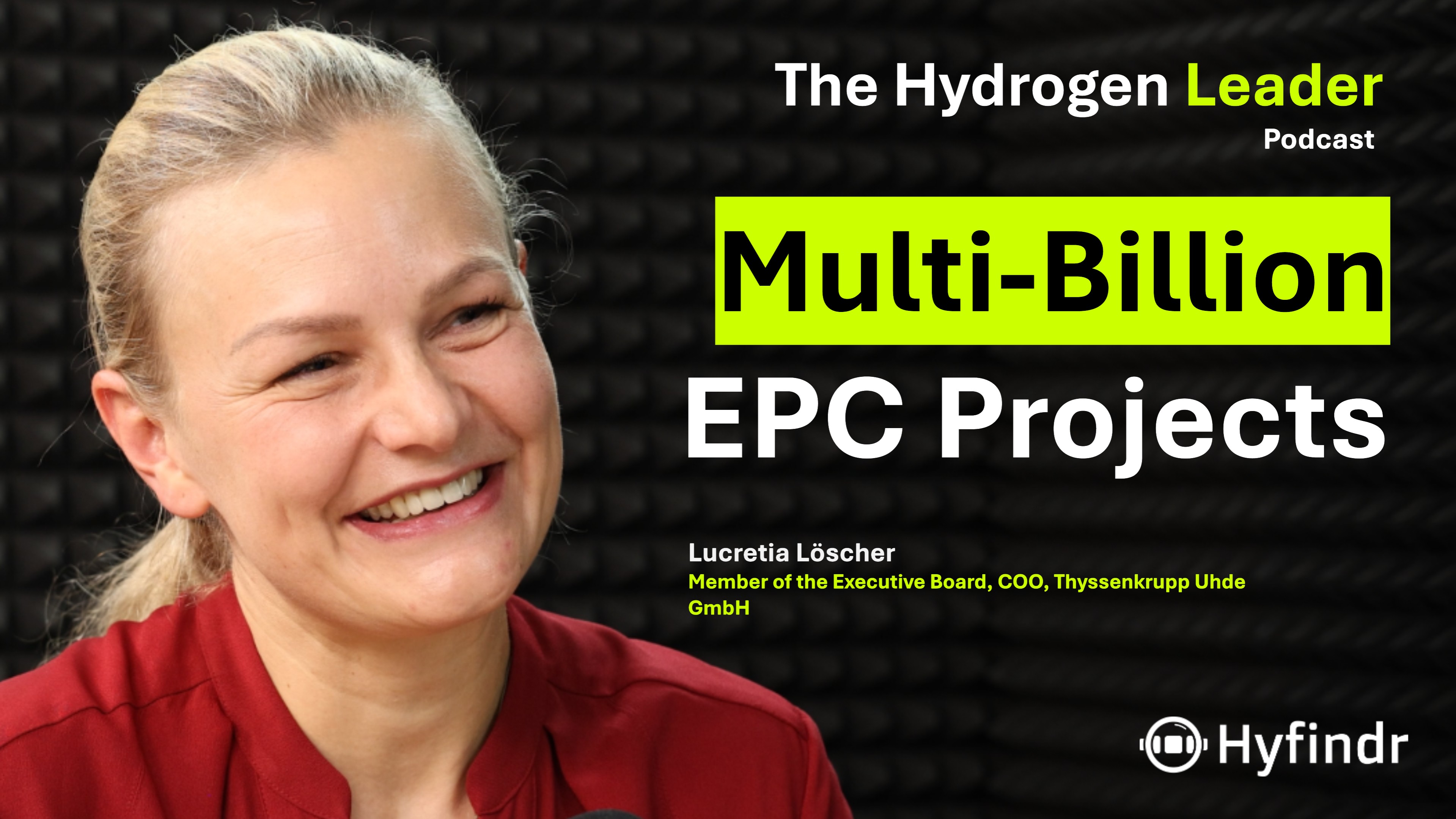In the latest episode of The Hydrogen Leader Podcast, we had the privilege of speaking with Lucretia Löscher, Chief Operating Officer at Thyssenkrupp Uhde; one of the leading figures driving large-scale hydrogen and ammonia projects across the globe.
From leading a global team of over 4,500 people to delivering billion-euro green hydrogen infrastructure, Lucretia brings a rare combination of deep technical expertise, strategic clarity and human-centered leadership. Her insights offer valuable lessons for anyone navigating the energy transition.
Leadership That Drives Impact
Lucretia’s leadership philosophy is grounded in values and purpose. Her focus is not on titles or hierarchy, but on impact — the ability to shape strategy, make decisions aligned with long-term goals, and execute them effectively.
“I didn’t aim to become a board member. I aimed to create value, for the company, for people, and for the planet,” she said.
This mindset shapes the way she approaches team building, project execution, and decision-making; all rooted in clarity, respect, and long-term thinking.
Engineering the Energy Transition
At Thyssenkrupp Uhde, Lucretia oversees technology and EPC (Engineering, Procurement, Construction) a rare combination that sets the company apart.
“Most players either license technology or execute EPC. We do both, which lets us optimize design, reduce cost, and make projects bankable,” she explained.
Their expertise spans the full lifecycle of green hydrogen, ammonia, and methanol projects, from feasibility studies and licensing to full-scale implementation. With fabrication hubs in countries like Thailand and execution teams in India, Egypt, and South Africa, the company’s global footprint allows it to deliver at scale.
Getting to FID: What It Really Takes
One of the key challenges in the hydrogen economy is getting projects across the line to Final Investment Decision (FID). Lucretia broke down the critical elements:
- Regulatory clarity
- Offtake agreements
- Efficient, bankable designs
- Technology trust and supply chain strength
She also emphasized that electrolyzer reliability, infrastructure readiness, and long-term project economics are all still evolving and that pioneers must take calculated risks to move the sector forward.
Green Ammonia, Formula 1, and What’s Next
Lucretia shared fascinating examples of real projects, including a modularized green methanol-to-gasoline plant that will help fuel Formula 1’s transition to sustainable fuels.
She also highlighted Thyssenkrupp Uhde’s ammonia cracking pilot in Germany, a critical step in enabling global hydrogen trade via shipping.
“Ammonia is already a well-understood, globally traded chemical. Cracking it back to hydrogen is a practical solution for long-distance energy transport.”
Lessons in Leadership and Resilience
Beyond the business and technology, Lucretia’s story is one of resilience. From growing up in East Germany to leading global industrial teams, she shared leadership lessons learned from mentors, as well as from tough moments, including having to make hard people decisions when change was needed.
“Leadership isn’t about being liked. It’s about doing the right thing, even when it’s hard, and doing it with respect.”
Her advice to women in energy and emerging leaders? “If you feel the drive, step up. We need more voices at the table and we need more people willing to lead with both empathy and courage.”
Conclusion: Leading the Hydrogen Economy with Vision
This episode is a must-listen for anyone working in hydrogen, EPC, or clean tech infrastructure. Lucretia Löscher’s mix of strategic clarity, global project execution, and human-centered leadership offers a roadmap for how we can scale the energy transition; not just with ambition, but with accountability.
To learn more, watch the full podcast episode here. If you like the video, please also subscribe The Hydrogen Leader podcast channel to get exclusive insights in leadership, personal growth, and the hydrogen revolution. Join Dr. Björn Lüssow, as he hosts podcast interviews with CEOs, industry leaders, and innovators shaping the clean energy transition.

